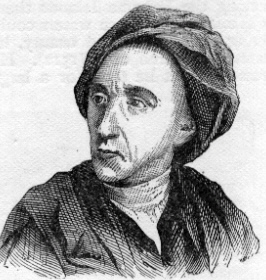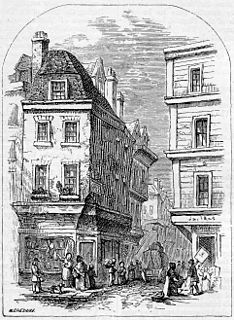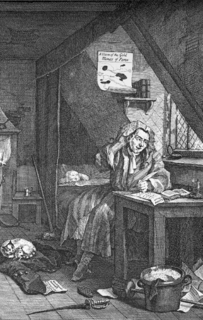
Alexander Pope was an English poet, translator, and satirist of the Enlightenment era who is considered one of the most prominent English poets of the early 18th century. An exponent of Augustan literature, Pope is best known for his satirical and discursive poetry including The Rape of the Lock, The Dunciad, and An Essay on Criticism, and for his translation of Homer.

Colley Cibber was an English actor-manager, playwright and Poet Laureate. His colourful memoir Apology for the Life of Colley Cibber (1740) describes his life in a personal, anecdotal and even rambling style. He wrote 25 plays for his own company at Drury Lane, half of which were adapted from various sources, which led Robert Lowe and Alexander Pope, among others, to criticise his "miserable mutilation" of "crucified Molière [and] hapless Shakespeare". He regarded himself as first and foremost an actor and had great popular success in comical fop parts, while as a tragic actor he was persistent but much ridiculed. Cibber's brash, extroverted personality did not sit well with his contemporaries, and he was frequently accused of tasteless theatrical productions, shady business methods, and a social and political opportunism that was thought to have gained him the laureateship over far better poets. He rose to ignominious fame when he became the chief target, the head Dunce, of Alexander Pope's satirical poem The Dunciad.
Edmund Curll was an English bookseller and publisher. His name has become synonymous, through the attacks on him by Alexander Pope, with unscrupulous publication and publicity. Curll rose from poverty to wealth through his publishing, and he did this by approaching book printing in a mercenary and unscrupulous manner. By cashing in on scandals, publishing pornography, offering up patent medicine, using all publicity as good publicity, he managed a small empire of printing houses. He would publish high and low quality writing alike, so long as it sold. He was born in the West Country, and his late and incomplete recollections say that his father was a tradesman. He was an apprentice to a London bookseller in 1698 when he began his career.
Mock-heroic, mock-epic or heroi-comic works are typically satires or parodies that mock common Classical stereotypes of heroes and heroic literature. Typically, mock-heroic works either put a fool in the role of the hero or exaggerate the heroic qualities to such a point that they become absurd.
Translatio studii is a historiographical concept, originating in the Middle Ages, in which history is viewed as a linear succession of transfers of knowledge or learning from one geographical place and time to another. The concept is closely linked to translatio imperii, which similarly describes the movement of imperial dominance. Both terms are thought to have their origins in the second chapter of the Book of Daniel in the Hebrew Bible.

Sir Richard Blackmore, English poet and physician, is remembered primarily as the object of satire and as an epic poet, but he was also a respected medical doctor and theologian.
In Latin literature, Augustan poetry is the poetry that flourished during the reign of Caesar Augustus as Emperor of Rome, most notably including the works of Virgil, Horace, and Ovid. In English literature, Augustan poetry is a branch of Augustan literature, and refers to the poetry of the 18th century, specifically the first half of the century. The term comes most originally from a term that George I had used for himself. He saw himself as an Augustus. Therefore, the British poets picked up that term as a way of referring to their endeavours, for it fit in another respect: 18th-century English poetry was political, satirical, and marked by the central philosophical problem of whether the individual or society took precedence as the subject of the verse.
Lewis Theobald, English textual editor and author, was a landmark figure both in the history of Shakespearean editing and in literary satire. He was vital for the establishment of fair texts for Shakespeare, and he was the first avatar of Dulness in Alexander Pope's The Dunciad.

The Dunciad is a landmark, mock-heroic, narrative poem by Alexander Pope published in three different versions at different times from 1728 to 1743. The poem celebrates a goddess Dulness and the progress of her chosen agents as they bring decay, imbecility, and tastelessness to the Kingdom of Great Britain.

Until the early 19th century, Grub Street was a street close to London's impoverished Moorfields district that ran from Fore Street east of St Giles-without-Cripplegate north to Chiswell Street. It was pierced along its length with narrow entrances to alleys and courts, many of which retained the names of early signboards. Its bohemian society was set amidst the impoverished neighbourhood's low-rent dosshouses, brothels and coffeehouses.

Augustan literature is a style of British literature produced during the reigns of Queen Anne, King George I, and George II in the first half of the 18th century and ending in the 1740s, with the deaths of Alexander Pope and Jonathan Swift, in 1744 and 1745, respectively. It was a literary epoch that featured the rapid development of the novel, an explosion in satire, the mutation of drama from political satire into melodrama and an evolution toward poetry of personal exploration. In philosophy, it was an age increasingly dominated by empiricism, while in the writings of political economy, it marked the evolution of mercantilism as a formal philosophy, the development of capitalism and the triumph of trade.
John Ozell was an English translator and accountant who became an adversary to Jonathan Swift and Alexander Pope.
John Tutchin was a radical Whig controversialist and gadfly English journalist, whose The Observator and earlier political activism earned him multiple trips before the bar. He was of a Puritan background and held strongly anti-Catholic views.
Leonard Welsted was an English poet and "dunce" in Alexander Pope's writings. Welsted was an accomplished writer who composed in a relaxed, light hearted vein. He was associated with Whig party political figures in his later years, but he was tory earlier, and, in the age of patronage, this seems to have been more out of financial need than anything else.
James Moore Smythe was an English playwright and fop.
James Ralph was an American-born English political writer, historian, reviewer, and Grub Street hack writer known for his works of history and his position in Alexander Pope's Dunciad B. His History of England in two volumes (1744–46) and The Case of the Authors by Profession of 1758 became the dominant narratives of their time.
Thomas Cooke, often called "Hesiod" Cooke, was a very active English translator and author who ran afoul of Alexander Pope and was mentioned as one of the "dunces" in Pope's Dunciad. His father was an innkeeper. He was educated at Felsted. Cooke arrived in London in 1722 and began working as a writer for the Whig causes. He associated with Thomas Tickell, Ambrose Philips, Leonard Welsted, Richard Steele, and John Dennis. Cooke is the source of one of the primary biographies of John Dennis, which he wrote in Latin.

The Distrest Poet is an oil painting produced sometime around 1736 by the British artist William Hogarth. Reproduced as an etching and engraving, it was published in 1741 from a third state plate produced in 1740. The scene was probably inspired by Alexander Pope's satirical poem The Dunciad. It depicts a scene in a small, dingy attic room where a poet sits at his desk in the dormer and, scratching his head, stares at the papers on the desk before him, evidently looking for inspiration to complete the poem he is writing. Near him sits his wife darning clothes, surprised by the entrance of a milkmaid, who impatiently demands payment of debts.

The Hilliad was Christopher Smart's mock epic poem written as a literary attack upon John Hill on 1 February 1753. The title is a play on Alexander Pope's The Dunciad with a substitution of Hill's name, which represents Smart's debt to Pope for the form and style of The Hilliad as well as a punning reference to the Iliad. In "Book the First" of The Hilliad, Hillario is seduced by a Sibyl to give up his career as an apothecary and instead becomes a writer. However, his fortune quickly descends with Hillario ultimately turning into the "arch-dunce".

The Author's Farce and the Pleasures of the Town is a play by the English playwright and novelist Henry Fielding, first performed on 30 March 1730 at the Little Theatre, Haymarket. Written in response to the Theatre Royal's rejection of his earlier plays, The Author's Farce was Fielding's first theatrical success. The Little Theatre allowed Fielding the freedom to experiment, and to alter the traditional comedy genre. The play ran during the early 1730s and was altered for its run starting 21 April 1730 and again in response to the Actor Rebellion of 1733. Throughout its life, the play was coupled with several different plays, including The Cheats of Scapin and Fielding's Tom Thumb.








